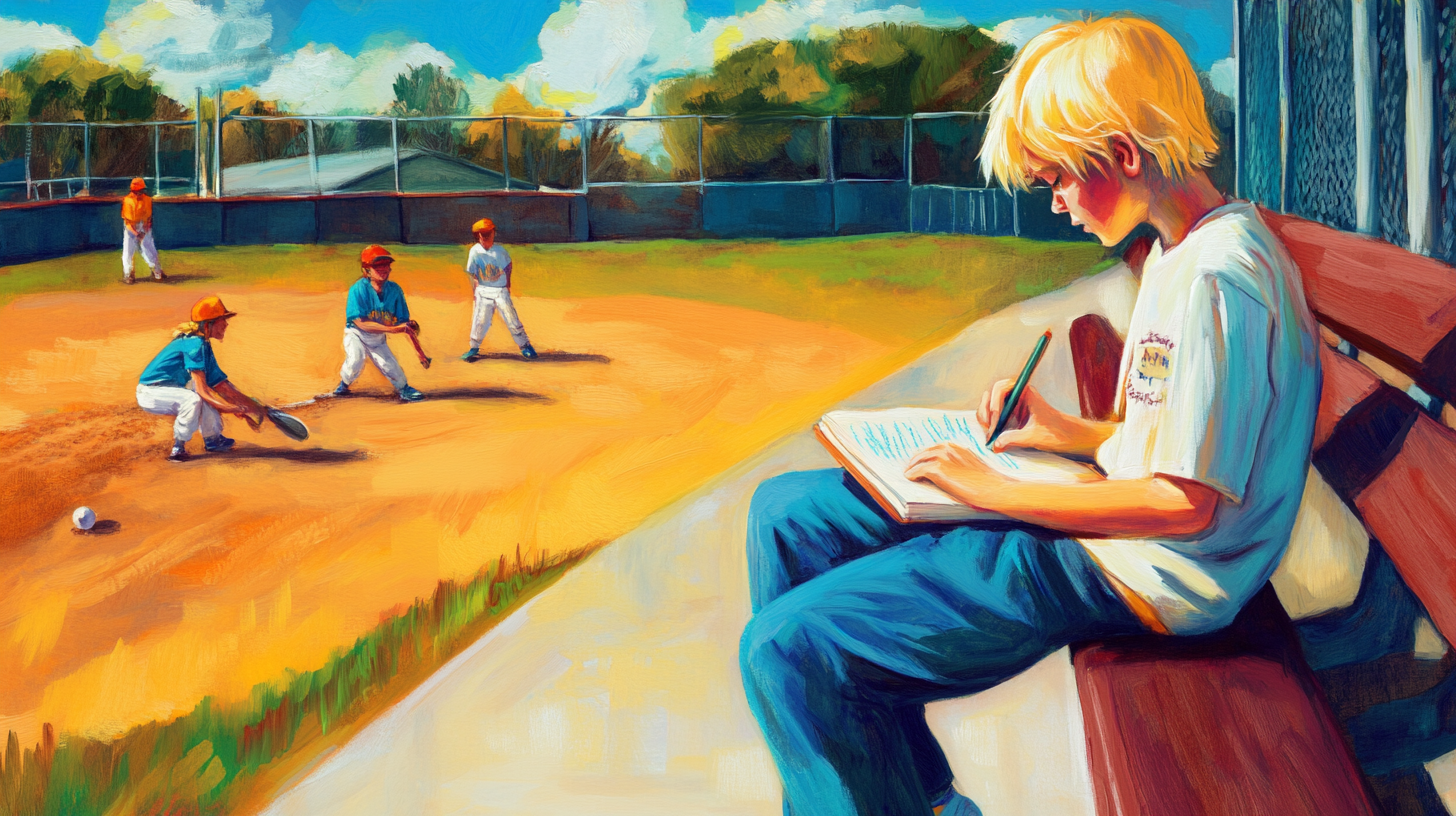How Writing Became My Lifeline: A Second‑Act Story
I don’t remember the exact date, trauma scoops out the middle of time like a melon baller, but I remember the blood. I’d lost a job that paid for my house and cars and somehow kept my life stitched together for the sake of my family. They cut me loose without a thought, and I spiraled.

From childhood notebooks to mental‑health freefall, through twenty years of freelance survival, to finally writing for myself — the brutally honest origin story behind my so‑called “personal brand.”
1. The Kid With the Notebook
The first thing I ever wanted was a pen that wouldn’t run out of ink. I was the lanky eight‑year‑old hunched over a wire‑bound notebook, claw‑gripping a cheap Bic while the grown‑ups worried I’d ruin my eyesight.
My classmates played baseball after school; I traded paragraphs. At recess I’d dash to the playground bench and scribble a story about what a piece of gum feels like when it’s being chewed, then tuck the pages under my shirt like contraband.
I didn’t have any friends or even kids who liked me; I had sentences, and that felt like enough.
I was an outcast, partly because I was the “wrong” religion and partly because I chose to live in a dream world instead of playing tag or throwing a Nerf football. Kids bullied me: the boy with teeth too big for his head and too crooked to be normal‑looking.
The silence I lived in also hid a darker secret. I heard voices — relentless, uninvited — that haunted my sleep and every waking hour. I thought it was normal until an elder at church warned that people who hear voices are possessed by demons.
I told no one. I wanted to protect my parents from the shame I imagined would follow. So I hid and wrote stories about the demons in my mind.
2. The Detour Called Adulthood
Then bills, hormones, heartbreak, capitalism, the usual suspects, barged in. I managed only an associate degree before changing majors, dropping out, and never returning until my fifties.
Writing never left, but it got pushed to the edges, forced to live in spiral notebooks that smelled like student‑loan panic. I took “real” jobs: fast‑food management, call centers, cubicles with cold Taco Bell inhaled between customer meltdowns. I tried so hard to be normal I could taste the failure before it arrived.
Spoiler: it arrived.
3. The Diagnosis Nobody Taught Me How to Spell
By twenty‑seven, the cracks were visible from space. By thirty‑three, depression wasn’t a sad song; it was an alien language chewing holes through my brain. Anxiety vibrated in my bones like bad electricity. The voices threatened to burst out, and I finally had to tell someone so I could get relief.
One therapist labeled it depressive‑type schizoaffective disorder with generalized anxiety. Later I learned I was mildly autistic. Another therapist simply said, “You’re carrying too many ghosts.”
Both were right.
I mutilated myself with razor blades. I kept trying to end my own life.
I cycled through day jobs the way some people cycle through passwords: earnestly, desperately, forgetting the last one as soon as the next crisis appeared.
HR managers would smile at my resume, hire me on Monday, and watch me crash into burnout by the end of the quarter. I wasn’t lazy; I was drowning in a chemical ocean I didn’t know how to swim.
4. The First Attempt
I don’t remember the exact date, trauma scoops out the middle of time like a melon baller, but I remember the blood. I’d lost a job that paid for my house and cars and somehow kept my life stitched together for the sake of my family. They cut me loose without a thought, and I spiraled.
I never went to the ER, just quietly visited my doctor on Monday and told him what happened.
I survived, or maybe I failed. In the psych ward they gave me paper without staples for safety and a golf pencil too short to weaponize. I filled it anyway: fragments, dialogue, scenes, poems. The nurses called me “the writer.” That tiny nickname kept my pulse steady.
5. Freelancing as a Life Raft
When I got out, I knew two things: I couldn’t keep a traditional job even if I could find one, and I couldn’t stop writing. I soon lost my wife and tried to hold things together for my kids. I spent more weeks in mental hospitals.
Disability helped ease the financial strain, but I had a family to feed.
Freelancing looked less like a career choice and more like the one doorway not blocked by my own brain. So I hung a shingle on the early‑2000s internet and took anything that paid: building websites, writing articles about mobile car washing, product descriptions for cheap ceramic vases, even personal brands for lazy tech bros in the Valley.
Money came in fits and spurts. Some months I was flush; other months I rationed oatmeal and ate ramen. But I could work at 3 a.m. if insomnia demanded or at 2 p.m. if the morning meds left me foggy. I could draft from a library, a coffee shop, a dingy studio apartment with peeling paint. Clients cared about deadlines, not dress codes. Freelancing became the elastic net that caught me every time I cracked.
6. Two Decades in the Wild West
Years blurred into invoices. I built a portfolio dense enough to impress strangers and thin enough to hide the chaos behind each piece. I learned SEO before it had a name, WordPress before real competition, and how to charm editors juggling three jobs themselves.
I also learned that loneliness can whistle through a home office louder than any fast‑food kitchen.
Some days, writing felt like oxygen; other days, like punishment for not choosing a simpler dream.
Whenever isolation bit too hard, I moonlighted as a web designer — code, pixels, color palettes — but even in Photoshop I found myself crafting copy blocks first and layouts second. Writing was the constant, the gravitational pull. The websites were just a different notebook.
7. Rock Bottom, Revisited
In 2011, divorced and tired of toxic people, I met a beautiful soul from the Philippines and decided to risk it all and move there. It was hard, especially because I tried to live the same way I had before.
2015 was the year the floor disappeared.
A cocktail of untreated depression, financial stress, and old habits in a new marriage shoved me back to the edge. The second suicide attempt was uglier than the first, mostly because I knew exactly what I was doing.
Survival felt like losing: a humiliating encore nobody wanted.
Afterward, I decided that if I couldn’t die, I was going to make the best of living. I took my meds, practiced mindfulness, exercised, and stopped being such a stubborn mule about accepting help.
Little by little, the fog thinned. I wrote about it in private journals, too raw for public eyes, but stringing words together felt like stitching skin over open wounds.
8. Enter Medium: The Plot Twist
Cue 2018 and a random tweet about a platform where anyone could publish essays beside big‑name authors. Medium looked slick, democratic, terrifying.
I posted a story called “Why I Failed at Almost Everything (And Why I’m Still Here).” I hit Publish and nearly threw up. Six people clapped. Two left comments thanking me for saying what they couldn’t.
Medium became my rehab, my MFA, my confessional booth. I wrote about mental illness, freelancing, impostor syndrome, the weird hope that shows up uninvited at 2 a.m.
The algorithm didn’t always love me, but the community did. More importantly, writing for myself — not a client brief — forced me to drop the marketing mask. I lost my ego and gained a voice.
9. Tattoos, Semicolons, and Staying Alive
I marked the milestone by tattooing a semicolon on my right wrist — the punctuation writers use when a sentence could have ended but decided not to. Nestled amid a full sleeve of ink, it reminds me daily that pauses are not periods, detours are not dead ends, and stories don’t finish until we stop telling them.
10. Craft, Without the Ego
Writing for readers instead of at them changes everything. I slashed adverbs, murdered clichés, learned rhythm by reading paragraphs aloud. I studied narrative structure like a mechanic studies engines; every essay was a hood popped open.
Likes were nice, but sentences that landed were better. I finally understood the writing‑workshop mantra: “Show, don’t tell.” Showing invites people into the room; telling keeps them stuck in the doorway.
I went back to college, until a massive heart attack in 2022 sidelined me. Six months later I was back in class and graduated in January 2024.
11. From Survival to Full‑Time
Then, after spending 4 months desperately looking for a writing job, a DM landed: a finance firm wanted a writer who could translate money‑speak into human English.
My soon‑to‑be boss had found me on Twitter and looked me up on LinkedIn. She liked my storytelling chops. Could I come on board, first part‑time, then full‑time, remote?
The kid with the notebook screamed yes; the adult with mental‑health scars whispered don’t blow this.
I didn’t blow it. The routine helped: nights blocking out articles about budgeting and family finance; mornings shaping my own brand, The Second Act Letter, into a newsletter about reinvention. For the first time, writing paid the bills without burning my soul to ash.
12. Lessons, or What the Wreckage Taught Me
- Dreams can hibernate. Writing dormant under bills and breakdowns isn’t dead.
- Mental health is not a side quest. Treat the brain; the words get better.
- Freelancing is a laboratory. Volume, discipline, client psychology, and the miracle of internet friends at 4 a.m.
- Platforms are bridges, not homes. Medium saved my voice, but my own site will outlive the algorithms.
- Success isn’t viral. It’s compound interest on tiny, repeated bravery: one essay, one pitch, one more day alive.
13. Today, and Tomorrow
Today I write about money by night and identity by day. I coach late‑blooming creatives who think it’s “too late” to start. I answer DMs from strangers who read my mental‑health essays at 3 a.m. and say it kept them from doing something permanent.
I’m not famous; I’m not rich. But the notebooks are still filling up, and the pen hasn’t run dry.
Tomorrow? Probably more words, more caffeine, more stubborn hope. Maybe a book. Maybe a speaking gig where I tell a room full of HR managers why talent sometimes comes wrapped in tattoos and hospital bracelets.
Maybe just another quiet morning where I look at a blank page and think, We’re still here. Let’s see what happens next.
